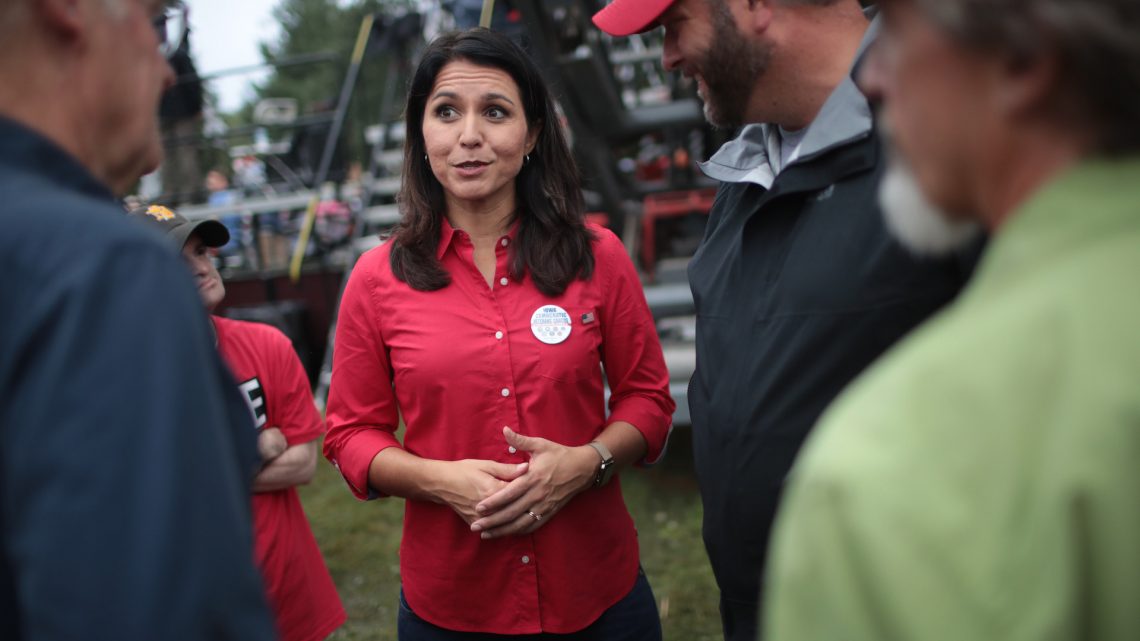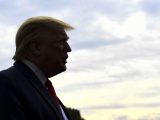
Who Is Tulsi Gabbard, Really?
October 26, 2019 Off By Daniel NewhauserWASHINGTON — Is she a desperate candidate seeking attention? A potential third-party spoiler? A Russian asset? Just sincerely pissed at the DNC?
Democratic Party insiders have some guesses, but really, they’re just deeply confused about Rep. Tulsi Gabbard’s latest campaign moves. In a year when several lower-tier presidential candidates seem to be confoundingly staying in past their campaigns’ expiration dates, Gabbard may be the one causing the most head-scratching.
And this week was her biggest and most confusing one yet.
The Hawaii congresswoman, who’s been polling anywhere between 1% and 3% in the 2020 Democratic primary, has spent the past week lashing out at Hillary Clinton and the DNC, after Clinton said on a podcast that Gabbard was “the favorite of the Russians.” Gabbard then appeared on Fox News with Sean Hannity to cast suspicion about how her House colleagues are conducting the impeachment inquiry.
To top off the week, she announced she’s betting the farm on her presidential candidacy. In a slickly produced video, she said she’d forego another run for her congressional seat: “I believe I can best serve the people of Hawaiʻi and our country as President and Commander-in-Chief.”
READ: How Tulsi Gabbard hacked the right-wing media feedback loop
Zac Petkanas, a former Hillary for America campaign aide, fiercely criticized Gabbard for excoriating Clinton in a widely-circulated campaign web video, and later on Hannity’s show. He said he believes she is “either wittingly or unwittingly” carrying water for Russians with her non-adversarial stance toward Syrian strongman Bashar Assad and hesitancy to support impeaching President Donald Trump..
“From the very beginning, Tulsi has positioned herself to try to be a spoiler in every election that she’s participated in this cycle,” he said. “During the primary campaign, she’s existed solely to throw outrageous attacks, to undermine Democratic candidates in the field, and now, to no one’s surprise, she’s talking about working to reelect Donald Trump by being the Jill Stein of the 2020 election.”
“It’s hard to see this as being anything other than her intent and goal from Day One,” he added.
To be clear, Gabbard has said she will not run as a third-party candidate — so staff at the DNC is taking her at her word and proceeding as such. Gabbard’s campaign declined a request for comment.
Speaking Thursday on the podcast “Angry Americans with Paul Rieckhoff,” a veterans advocate, Gabbard reiterated that she would take her campaign all the way to the Democratic convention — and that she wouldn't launch a third-party bid.
‘My goal is to actually strengthen the party’
"I will not. No," she said, calling Clinton's claims baseless. "My interest and goal is not to just leave the party and run separately, as I've said. My goal is to actually strengthen the party."
It’s not exactly novel for a candidate to use the DNC as a foil. Inside the DNC, Gabbard’s machinations are being viewed as little more than that: trying to bolster her flagging campaign by pitching it as her against the system.
If that were the case, it could explain some of the unconventional campaign moves. As of Friday, Gabbard is on the outside looking in for the November debate. She has reached the threshold for at least 165,000 individual campaign donors but has yet to meet the 3% cutoff in enough polls. She has one qualifying poll with that result, but she needs four.
Yet even as the DNC projects a shoulder shrug, there’s a feeling that they’d rather not engage with Gabbard, lest they poke the bear or give her line of attack any more attention. That does indicate some level of unease with a candidate who could be a wild card.
Ed Rendell, the former DNC chairman and Pennsylvania governor who is supporting the Biden campaign, predicted that if Gabbard’s goal is to be a disruptive force at the convention, she is likely to fall flat.
“I don’t think she can be a factor. She’s not going to have many votes and our people have learned. I really believe that,” he said, pointing out that a contingent of Bernie Sanders’ 2016 supporters only managed to disrupt the Democratic National Convention because he had so many delegates there in the first place due to his strong primary campaign. Gabbard is currently polling in the low single digits and on pace to win zero delegates.
A third-party run worried him more, but Rendell said he thought liberals were less likely to bolt given what happened last election.
“I hope that our folks have learned their lesson from 2016. Jill Stein and the Green Party ticket got more votes in Wisconsin, Michigan, and Pennsylvania than Hillary lost by,” he said.” I think our people are not going to make that mistake again.”
Despite Gabbard’s assertions she won’t run as a third-party candidates, campaign prognosticators have begun asking whether a Gabbard third-party run would even hurt Democrats, rather than hurt President Donald Trump by drawing disaffected Republicans to a campaign of someone promising a better way.
There might be more evidence to back that up, said ballot-access expert Richard Winger. He said research and campaign postmortems have shown that a third-party candidate is not a factor in siphoning away votes from a similar major-party candidate.
“These people who throw around ‘spoiler’ are ignorant of the research that contradicts their thinking,” Winger said. “It just drives me crazy. There’s all this sophisticated psychological research and historical data that gets ignored and people just assume that a Green [Party candidate] or somebody like that hurts Democrats automatically.”
He also added that there would be significant institutional hurdles to get Gabbard on state ballots, namely state-level qualifications and sore-loser laws, which vary from state to state but are fairly strict in some key states.
Unless Gabbard ran as a candidate of an established third party, like the Green Party or the Libertarian Party, she’d have a hard time getting on the ballot anywhere. Her ideology doesn’t exactly square with either of those parties, though, and their conventions are held in May and July respectively — before the DNC’s July convention — meaning they would have named their nominees before Gabbard would even have a chance to be spurned by the DNC one final time.
David Uberti contributed reporting.
Cover: Democratic presidential candidate and Hawaii congresswoman Tulsi Gabbard greets guests at the Polk County Democrats' Steak Fry on September 21, 2019 in Des Moines, Iowa. (Photo by Scott Olson/Getty Images)


